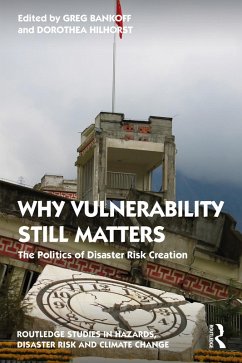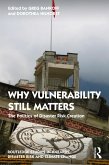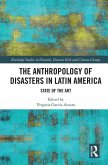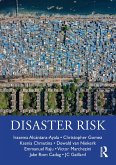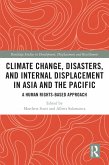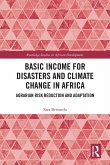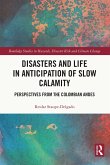Why Vulnerability Still Matters (eBook, ePUB)
The Politics of Disaster Risk Creation
Redaktion: Bankoff, Greg; Hilhorst, Dorothea
38,95 €
38,95 €
inkl. MwSt.
Sofort per Download lieferbar

19 °P sammeln
38,95 €
Als Download kaufen

38,95 €
inkl. MwSt.
Sofort per Download lieferbar

19 °P sammeln
Jetzt verschenken
Alle Infos zum eBook verschenken
38,95 €
inkl. MwSt.
Sofort per Download lieferbar
Alle Infos zum eBook verschenken

19 °P sammeln
Why Vulnerability Still Matters (eBook, ePUB)
The Politics of Disaster Risk Creation
Redaktion: Bankoff, Greg; Hilhorst, Dorothea
- Format: ePub
- Merkliste
- Auf die Merkliste
- Bewerten Bewerten
- Teilen
- Produkt teilen
- Produkterinnerung
- Produkterinnerung

Bitte loggen Sie sich zunächst in Ihr Kundenkonto ein oder registrieren Sie sich bei
bücher.de, um das eBook-Abo tolino select nutzen zu können.
Hier können Sie sich einloggen
Hier können Sie sich einloggen
Sie sind bereits eingeloggt. Klicken Sie auf 2. tolino select Abo, um fortzufahren.

Bitte loggen Sie sich zunächst in Ihr Kundenkonto ein oder registrieren Sie sich bei bücher.de, um das eBook-Abo tolino select nutzen zu können.
We think vulnerability still matters when considering how people are put at risk from hazards and this book shows why in a series of thematic chapters and case studies written by eminent disaster studies scholars that deal with the politics of disaster risk creation: precarity, conflict, and climate change.
- Geräte: eReader
- ohne Kopierschutz
- eBook Hilfe
- Größe: 3.51MB
Andere Kunden interessierten sich auch für
![Why Vulnerability Still Matters (eBook, PDF) Why Vulnerability Still Matters (eBook, PDF)]() Why Vulnerability Still Matters (eBook, PDF)38,95 €
Why Vulnerability Still Matters (eBook, PDF)38,95 €![The Anthropology of Disasters in Latin America (eBook, ePUB) The Anthropology of Disasters in Latin America (eBook, ePUB)]() The Anthropology of Disasters in Latin America (eBook, ePUB)41,95 €
The Anthropology of Disasters in Latin America (eBook, ePUB)41,95 €![Disaster Risk (eBook, ePUB) Disaster Risk (eBook, ePUB)]() Irasema Alcántara-AyalaDisaster Risk (eBook, ePUB)37,95 €
Irasema Alcántara-AyalaDisaster Risk (eBook, ePUB)37,95 €![Climate Change, Disasters, and Internal Displacement in Asia and the Pacific (eBook, ePUB) Climate Change, Disasters, and Internal Displacement in Asia and the Pacific (eBook, ePUB)]() Climate Change, Disasters, and Internal Displacement in Asia and the Pacific (eBook, ePUB)41,95 €
Climate Change, Disasters, and Internal Displacement in Asia and the Pacific (eBook, ePUB)41,95 €![Climate Change and Risk in South and Southeast Asia (eBook, ePUB) Climate Change and Risk in South and Southeast Asia (eBook, ePUB)]() Climate Change and Risk in South and Southeast Asia (eBook, ePUB)41,95 €
Climate Change and Risk in South and Southeast Asia (eBook, ePUB)41,95 €![Basic Income for Disasters and Climate Change in Africa (eBook, ePUB) Basic Income for Disasters and Climate Change in Africa (eBook, ePUB)]() Sara BernardoBasic Income for Disasters and Climate Change in Africa (eBook, ePUB)41,95 €
Sara BernardoBasic Income for Disasters and Climate Change in Africa (eBook, ePUB)41,95 €![Disasters and Life in Anticipation of Slow Calamity (eBook, ePUB) Disasters and Life in Anticipation of Slow Calamity (eBook, ePUB)]() Reidar Staupe-DelgadoDisasters and Life in Anticipation of Slow Calamity (eBook, ePUB)43,95 €
Reidar Staupe-DelgadoDisasters and Life in Anticipation of Slow Calamity (eBook, ePUB)43,95 €-
-
-
We think vulnerability still matters when considering how people are put at risk from hazards and this book shows why in a series of thematic chapters and case studies written by eminent disaster studies scholars that deal with the politics of disaster risk creation: precarity, conflict, and climate change.
Dieser Download kann aus rechtlichen Gründen nur mit Rechnungsadresse in A, B, BG, CY, CZ, D, DK, EW, E, FIN, F, GR, HR, H, IRL, I, LT, L, LR, M, NL, PL, P, R, S, SLO, SK ausgeliefert werden.
Produktdetails
- Produktdetails
- Verlag: Taylor & Francis eBooks
- Seitenzahl: 254
- Erscheinungstermin: 27. April 2022
- Englisch
- ISBN-13: 9781000570991
- Artikelnr.: 63907534
- Verlag: Taylor & Francis eBooks
- Seitenzahl: 254
- Erscheinungstermin: 27. April 2022
- Englisch
- ISBN-13: 9781000570991
- Artikelnr.: 63907534
- Herstellerkennzeichnung Die Herstellerinformationen sind derzeit nicht verfügbar.
Greg Bankoff works on community resilience and the way societies adapt to hazard as a frequent life experience. For the last 30 years, he has focused his research on understanding how societies, both past and present, have learnt to normalise risk and the way communities deal with crisis through a historical sociological approach. His publications include co-authoring The Red Cross's World Disaster Report 2014: Focusing on Culture and Risk and a companion, coedited volume entitled Cultures and Disasters: Understanding Cultural Framings in Disaster Risk Reduction (2015). Dorothea Hilhorst focuses on aid-society relations: studying how aid is shaped by the manifold actions of actors in and around programmes for protection, service delivery and capacity development. She has a special interest in the intersections of humanitarianism with development, peacebuilding, and gender-relations. She has done extensive work on humanitarian accountability and situations where disasters meet conflict. Her research programmes have taken place in many settings affected by disaster, conflict, and fragility. Currently, her main research programme concerns changes in humanitarian governance and opportunities for accountability and advocacy, and practices of transactional sex in humanitarian crisis situations.
List of Illustrations
List of Contributors
Index
List of Contributors
- Introduction: Why vulnerability still matters. Dorothea Hilhorst and Greg Bankoff
- Remaking the world in our own image: Vulnerability, resilience, and adaptation as historical discourses. Greg Bankoff
- Between precarity and the security state: A post-vulnerability view. Kenneth Hewitt
- Creating disaster risk and constructing gendered vulnerability. Sarah Bradshaw, Brian Linneker, and Lisa Overton
- What must be done to rescue the concept of vulnerability? Terry Cannon
- Disaster studies and its discontents: The postcolonial state in hazard and risk creation. Ayesha Siddiqi
- Humanitarianism: Navigating between resilience and vulnerability. Dorothea Hilhorst
- Resilience, food security, and the abandonment of crisis-affected populations. Susanne Jaspars
- Vulnerability and resilience in a complex and chaotic context: Evidence from Mozambique. Luís Artur
- Power writ small and large: How disaster cannot be understood without reference to pushing, pulling, coercing, and seducing. Ben Wisner.
- Disaster risk creation: The new vulnerability. Thea Dickinson and Ian Burton
- Vulnerable Anthropocenes?: Towards an integrated approach. Kasia Mika and Ilan Kelman.
- 'The hottest summer ever!': Exploring vulnerability to climate change among grain producers in Eastern Norway. Bjørnar Sæther and Karen O'Brien
Part I Why Vulnerability Still Matters
Part II Vulnerability, Conflict, and State-society Relations
Part III Disaster Risk Creation
Index
List of Illustrations
List of Contributors
Index
List of Contributors
- Introduction: Why vulnerability still matters. Dorothea Hilhorst and Greg Bankoff
- Remaking the world in our own image: Vulnerability, resilience, and adaptation as historical discourses. Greg Bankoff
- Between precarity and the security state: A post-vulnerability view. Kenneth Hewitt
- Creating disaster risk and constructing gendered vulnerability. Sarah Bradshaw, Brian Linneker, and Lisa Overton
- What must be done to rescue the concept of vulnerability? Terry Cannon
- Disaster studies and its discontents: The postcolonial state in hazard and risk creation. Ayesha Siddiqi
- Humanitarianism: Navigating between resilience and vulnerability. Dorothea Hilhorst
- Resilience, food security, and the abandonment of crisis-affected populations. Susanne Jaspars
- Vulnerability and resilience in a complex and chaotic context: Evidence from Mozambique. Luís Artur
- Power writ small and large: How disaster cannot be understood without reference to pushing, pulling, coercing, and seducing. Ben Wisner.
- Disaster risk creation: The new vulnerability. Thea Dickinson and Ian Burton
- Vulnerable Anthropocenes?: Towards an integrated approach. Kasia Mika and Ilan Kelman.
- 'The hottest summer ever!': Exploring vulnerability to climate change among grain producers in Eastern Norway. Bjørnar Sæther and Karen O'Brien
Part I Why Vulnerability Still Matters
Part II Vulnerability, Conflict, and State-society Relations
Part III Disaster Risk Creation
Index
